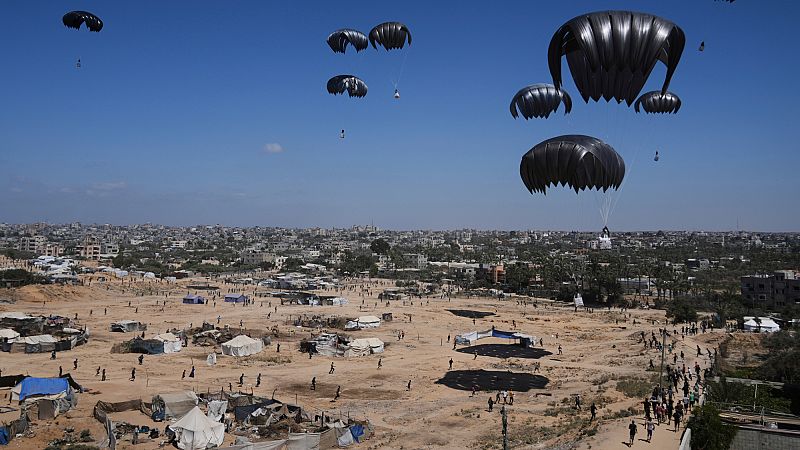United Nations says driving aid into Gaza is cheaper and safer

Life-saving aid is being dropped from the sky in the Gaza Strip, but this latest way of delivering assistance to the Palestinians there is not without controversy.
Scenes of desperation and chaos play out on the ground as hundreds of thousands of hungry people scramble to get their hands on some of the food.
The United Nations has warned that these drops are not only ineffective and expensive, but also dangerous, highlighting urgent calls for a more organised and humane distribution methods.
The resumption of aid airdrops comes amid months of warnings from humanitarian organisations of a worsening starvation in Gaza, where access to necessities has been severely restricted since Israel closed all crossings to the enclave in March.
Pressured by international outcry, Israeli military aircraft parachuted aid parcels into open fields over Al-Zawaida in central Gaza.
As the supplies hit the ground, displaced civilians surged toward the packages in a frenzy, pushing, falling over one another.
Some aid parcels were damaged on impact, while others caused injuries as they landed, emphasising the need for safer distribution methods.
"These airdrops are a mistake. Look how people are trampling each other. There must be an organised alternative, like establishing a dedicated committee to distribute aid supplies," said Raji Abu Amra, a displaced Palestinian.
Near the drop zone, a woman trembles, ill and frantic, as she searches for her missing children who had run after the falling supplies.
"This aid distribution method is wrong. My children ran after the aid parcels. I don't know if they're injured or dead,” said Um Osama Mlihhi, another displaced Palestinian.
Palestinians report being forced to resort to extreme measures to reach the long-awaited parcels.
"This is a brutal siege. I was never like this before, now my bones protrude. My children suffer the same. For a full month, we've survived on lentils mixed with sand," said Nasser Al-Mashi, a displaced Palestinian.
Despite ongoing airdrops, humanitarian aid groups warn that food reaching Gazans falls catastrophically short of preventing mass starvation.
The United Nations and aid organisations say only reopening border crossings and restoring the UN's role in relief efforts can ensure enough supplies reach the starving and displaced people of Gaza.
Today

